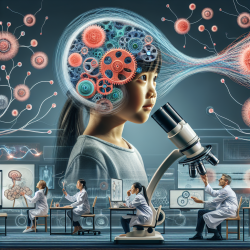Introduction
The developing brain is a marvel of growth and potential, yet it is also vulnerable to various environmental insults. One such threat is prenatal ethanol exposure, which can lead to Fetal Alcohol Spectrum Disorders (FASD). The recent study titled "Ethanol-Induced Neurodegeneration and Glial Activation in the Developing Brain" provides critical insights into the mechanisms of ethanol-induced brain damage, highlighting the role of glial activation in neurodegeneration.
Understanding the Research
The study emphasizes the dual role of glial cells—microglia and astrocytes—in the developing brain. While acute ethanol exposure can trigger protective responses, chronic exposure often results in a proinflammatory state that exacerbates neurodegeneration. This nuanced understanding is pivotal for practitioners aiming to mitigate the adverse effects of prenatal ethanol exposure.
Implementing Research Outcomes
Practitioners can leverage these findings in several ways:
- Early Intervention: Identifying children at risk for FASD and implementing early intervention strategies can help mitigate long-term cognitive and behavioral deficits.
- Targeted Therapies: Developing therapies that modulate glial activation could offer neuroprotective benefits, potentially reversing or reducing ethanol-induced damage.
- Parental Education: Educating expectant parents about the risks of alcohol consumption during pregnancy is crucial in preventing FASD.
Encouraging Further Research
The study opens avenues for further research, particularly in understanding the balance between neuroprotective and neurotoxic glial responses. Investigating the long-term impact of glial activation on brain architecture and function could lead to novel therapeutic approaches.
Conclusion
As speech-language pathologists and educators, we are uniquely positioned to advocate for and implement data-driven strategies that support children's development. By integrating research findings into practice, we can make informed decisions that enhance outcomes for children affected by FASD.
To read the original research paper, please follow this link: Ethanol-Induced Neurodegeneration and Glial Activation in the Developing Brain.










